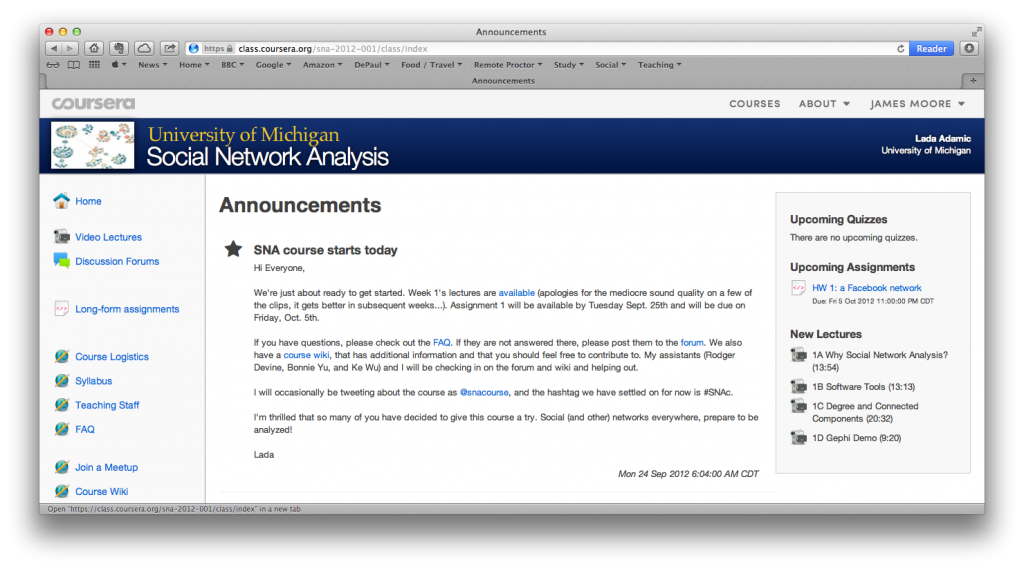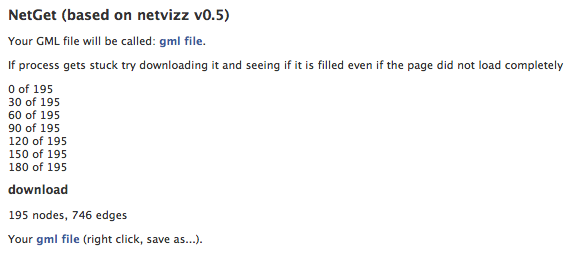Just started my second Coursera MOOC (Social Network Analysis). Very interesting to notice the changes and improvements going forward. Coursera is now sending an updated email alert when the course is about to start:
Today’s the first day of Social Network Analysis. Here’s checklist to help you get started:
✔ Log in to the course and review the syllabus
✔ Watch the first lecture
✔ Go to the forum and introduce yourself (i.e. Hi! My name is Gustavo and
I’m from San Francisco.) Don’t worry, they won’t bite!
✔ Schedule a time to watch the video lectures and do the assignments
each week
✔ Visit meetup.com/coursera to see if there’s a in-person meetup
happening in your area
✔ Fill out your profile (if you haven’t already!)
✔ Have fun!Let the learning begin!
Your Coursera Team
Logging into the course for the first time, students are now presented with these honour code statements:
In order to ensure fairness, all students participating in any of our online classes must agree to abide by the following code of conduct:
I will register for only one account.
My answers to homework, quizzes and exams will be my own work (except for assignments that explicitly permit collaboration).I will not make solutions to homework, quizzes or exams available to anyone else. This includes both solutions written by me, as well as any official solutions provided by the course staff.
I will not engage in any other activities that will dishonestly improve my results or dishonestly improve/hurt the results of others.
The first assignment looks very interesting, and involves downloading data from my Facebook network (195 contacts) and loading this into Gephi. Looking forward into how things progress.
One of my initial observations is how the grading policy for this course is markedly different to the previous one. I don’t know how much direction Coursera provides to faculty. Policy is as follows:
Grading scheme
non-programming option 8 homework assignments are worth 10 points each. The 7 highest scores will be counted toward 70% of the grade (i.e. I will be dropping the lowest score from your assignments) . The final exam (multiple choice + short answer) counts for 30% of the final grade. A certificate will be issued to those achieving 80%+ of the total points possible.programming option If you select this option, in addition to the regular assignments there will be ~4 programming assignments, the last of which will be a an independent mini-project to be peer-evaluated. The projects can optionally be submitted to the forum. Those voted up by the community will be featured and discussed in a Google Hangout session.
Late policy
I realize that many of you are leading busy lives and may not always be able to meet the deadlines. You can always skip one of the assignments (only the top 7 will be counted). You also have an allocation of late days (8 in total). If you don’t allocate late days, the assignment will be marked down 10%/day. These lenient policies are meant to encourage you to submit work throughout the course without stressing too much about deadlines.
Also, there are four teaching staff rather than one in my previous course. I wonder if this is a model Coursera is moving towards, or if this was just a decision for this course and the nature of the assignments.
One thing of particular note with the Coursera videos, is that they provide subtitles as a standard. The FAQs indicate that the primary focus here is for students where English is not their first language, not students with disabilities.

